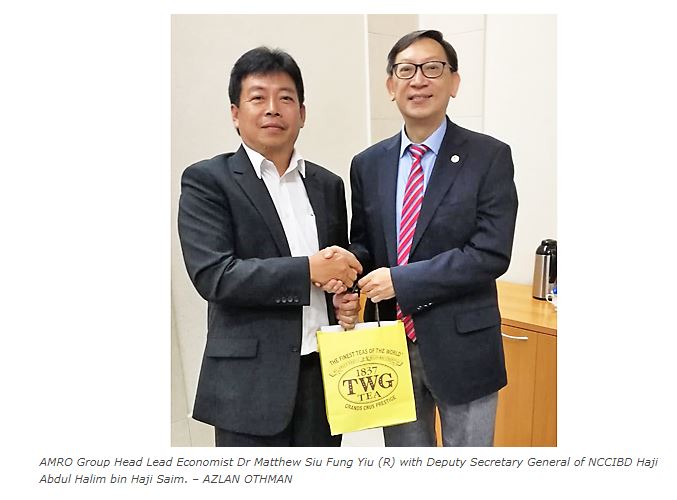Brunei economy to grow by 2.1pc in 2019, 2.0pc in 2020: AMRO
BRUNEI Darussalam’s gross domestic product (GDP) growth is forecast to stay at 2.1 per cent this year and 2.0 per cent next year, according to the July update of the ASEAN+3 Regional Economic Outlook (AREO) released on July 23 by the ASEAN+3 Macroeconomic Research Office (AMRO), an ASEAN+3 think tank.
The AMRO also predicted similar growth for Brunei in May this year, projecting the country’s economy to expand by 2.1 per cent in 2019, due to the start of operations for the Hengyi oil refinery and petrochemical plant on Pulau Muara Besar and stronger foreign direct investment inflows.
The regional macroeconomic surveillance organisation also said that major risks to Brunei’s economy in the medium term will come mainly from domestic factors as a result of the country’s high reliance on the oil and gas sector.
The recovery in world oil prices in 2016 has helped the Brunei economy in the forthcoming two years, but an unexpected shortfall in oil and LNG production in 2018 has stunted economic growth since. This reality is also expected to hamper the government’s ability to support the economy.
On the external side, the major risk primarily stems from the possibility of a sharp decline in global oil and gas prices, while other external risks are expected to have a smaller impact to the economy. In particular, Brunei is less susceptible to spillovers from global trade conflicts given its relatively low engagement in the global value chain.
As for the whole ASEAN+3 region — comprising 10 ASEAN member states plus China, Japan and Korea — AMRO has trimmed its economic growth projection to 4.9 per cent for this year and 2020 from its May projections of 5.1 per cent and five per cent respectively, due to “continuing weakness in manufacturing and export outturns”.
In another development, the National Chamber of Commerce and Industry Brunei Darussalam (NCCIBD) was invited to participate in a dialogue with the AMRO recently.
The AMRO delegation was led by Group Head/Lead Economist Dr Matthew Siu Fung Yiu accompanied by three officers, while the NCCIBD was represented by their Deputy Secretary General Haji Abdul Halim bin Haji Saim. DARe (Darussalam Enterprise) CEO Javed Ahmed and two officers from the Ministry of Energy, Manpower and Industry (MEMI) also attended the dialogue session.
In a separate report, the Washington-based International Monetary Fund (IMF) also cut its 2019 growth projection for ‘ASEAN-5’ (made up of the Philippines, Indonesia, Malaysia, Thailand and Vietnam) to five per cent from 5.1 per cent previously. The IMF’s World Economic Outlook (WEO) Update report released yesterday also lowered the 2020 growth outlook for ASEAN-5 from 5.2 per cent in its April report to 5.1 per cent.
The IMF sees global growth slowing to 3.2 per cent this year and 3.5 per cent next year, from 3.6 per cent last year and 3.8 per cent in 2017.
“Global growth remains subdued. Since the April WEO report, the US further increased tariffs on certain Chinese imports and China retaliated by raising tariffs on a subset of US imports,” the IMF said. “Additional escalation was averted following the June G20 summit. Global technology supply chains were threatened by the prospect of US sanctions and continued Brexit-related uncertainty, while rising geopolitical tensions have roiled energy prices.”
Source: https://borneobulletin.com.bn/brunei-economy-grow-2-1pc-2019-2-0pc-2020-amro/


 English
English




